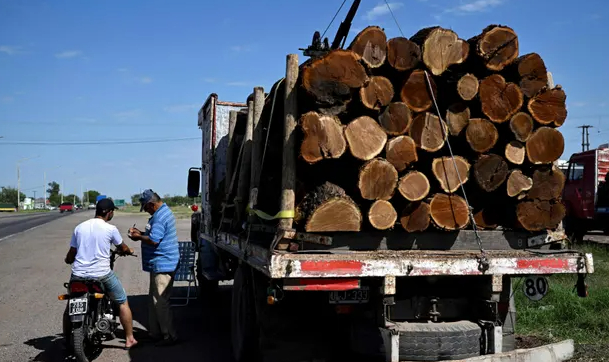November 27, 2025 | 23:44 GMT +7
November 27, 2025 | 23:44 GMT +7
Hotline: 0913.378.918
November 27, 2025 | 23:44 GMT +7
Hotline: 0913.378.918

The scientists say wind and solar should be used to generate electricity instead of burning forest bioenergy. Photo: Luis Robayo/AFP/Getty
More than 650 scientists are urging world leaders to stop burning trees to make energy because it destroys valuable habitats for wildlife.
In the buildup to Cop15, the UN biodiversity summit, they say countries urgently need to stop using forest bioenergy to create heat and electricity as it undermines international climate and nature targets. Instead, renewable energy sources such as wind and solar should be used, they say.
Bioenergy has “wrongly been deemed ‘carbon neutral’” and many countries are increasingly relying on forest biomass to meet net zero goals, according to the letter, addressed to world leaders including Joe Biden, Rishi Sunak and the European Commission president, Ursula von der Leyen. “The best thing for the climate and biodiversity is to leave forests standing – and biomass energy does the opposite,” it says.
The letter says that if global leaders agree to protect 30% of land and sea by 2030 at the Cop15 meeting in Montreal, they must also commit to ending reliance on biomass energy. Commitments made at Cop15 and at climate conferences could be undermined if this practice continues, it says.
Prof Alexandre Antonelli, a lead author of the letter and director of science at Kew Gardens, said: “Ensuring energy security is a major societal challenge, but the answer is not to burn our precious forests. Calling this ‘green energy’ is misleading and risks accelerating the global biodiversity crisis.”
By 2030, bioenergy is expected to account for a third of “low-carbon” energy, according to a report by the International Energy Agency.
The UK is the top importer of wood pellets for biomass, and in 2019 more than 5m metric tonnes of them were brought in from the US. Burning biomass is an important part of the UK’s net zero strategy, and has been subsidised by £5.6bn over the past decade.
Cutting down trees for bioenergy results in the release of carbon that would otherwise had been locked up in carbon-rich forests. This increases emissions and creates “carbon debt”, which is only paid off decades or even centuries later if the trees are regrown, the scientists say.
Burning wood for electricity is also inefficient, releasing comparatively more carbon into the atmosphere than gas or coal. Additional energy is used to harvest and transport the wood. Experts have been warning for years about the climate impacts of bioenergy, but now they are also finding out that it has dire risks for nature too, with many cases of protected forests being affected.
Canada, Estonia and the US are the largest providers of wood for biomass. Prof William Moomaw, a lead author of the letter from Tufts University in Massachusetts in the US, said: “Our forests are the most biodiverse places on the planet, providing habitat for countless species. They are also absorbing nearly 30% of all global emissions from burning fossil fuels.
“Clearcutting for forest bioenergy is degrading the south-east US coastal forests, a global biodiversity hotspot, the Baltic states in Europe, boreal forests in Canada, and illegally cutting protected forest ecosystems in the Carpathians of eastern Europe. These are all home to irreplaceable rare plant species, mammals, and migratory and residential birds.”
Rare species such as the prothonotary warbler, the boreal woodland caribou and the black stork are among those declining as a result of forest degradation.
Elly Pepper, from the Natural Resources Defense Council (NRDC) and Cut Carbon Not Forests Coalition (CCNF), said: “Governments and the bioenergy industry each have one hand on an axe that is decimating the world’s forests. Continuing to put a fake renewable like biomass energy at the heart of their net zero plans will undermine any global deal promising to save nature by 2030.
“The world’s wildlife is already vanishing, and the bioenergy industry is helping to accelerate that by destroying precious forest habitats.”
(The Guardian)

(VAN) A new study reveals how the simultaneous effects of ocean acidification, salinity and loss of oxygen are making the world more fragile.

(VAN) Hopes are growing that the creation of the first 3D turkey gut model could be a turning point in the battle against the virulent blackhead disease.

(VAN) Tyson, America’s biggest meat supplier, plans to shutter one of its largest beef processing plants as the industry continues to struggle with low cattle supplies and political pressure from Washington.

(VAN) New FAO study shows how digital solutions are empowering farmers and fishers to prevent losses and build resilient agrifood systems.

(VAN) Brazil's COP30 presidency pushed through a compromise climate deal on Saturday that would boost finance for poor nations coping with global warming but that omitted any mention of the fossil fuels driving it.

(VAN) Poultry farmers in the UK have been warned that they could face one of the worst winters yet for bird flu.

(VAN) Prices of main-crop paddy have risen sharply, with jasmine rice hitting 16,100 baht per tonne — the highest level in years.